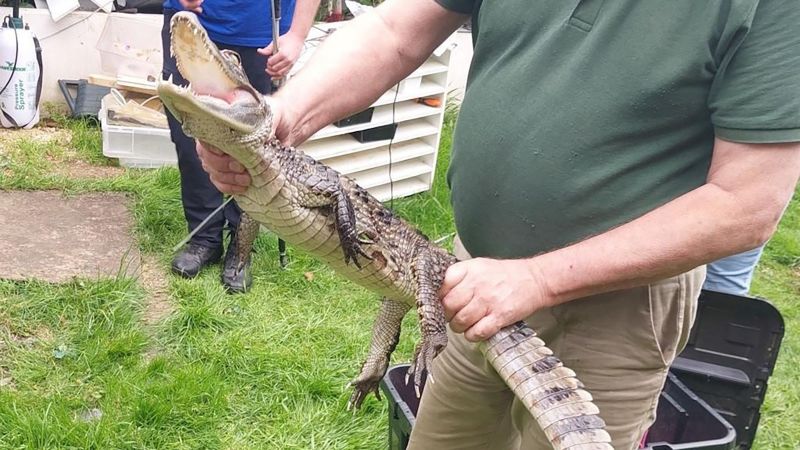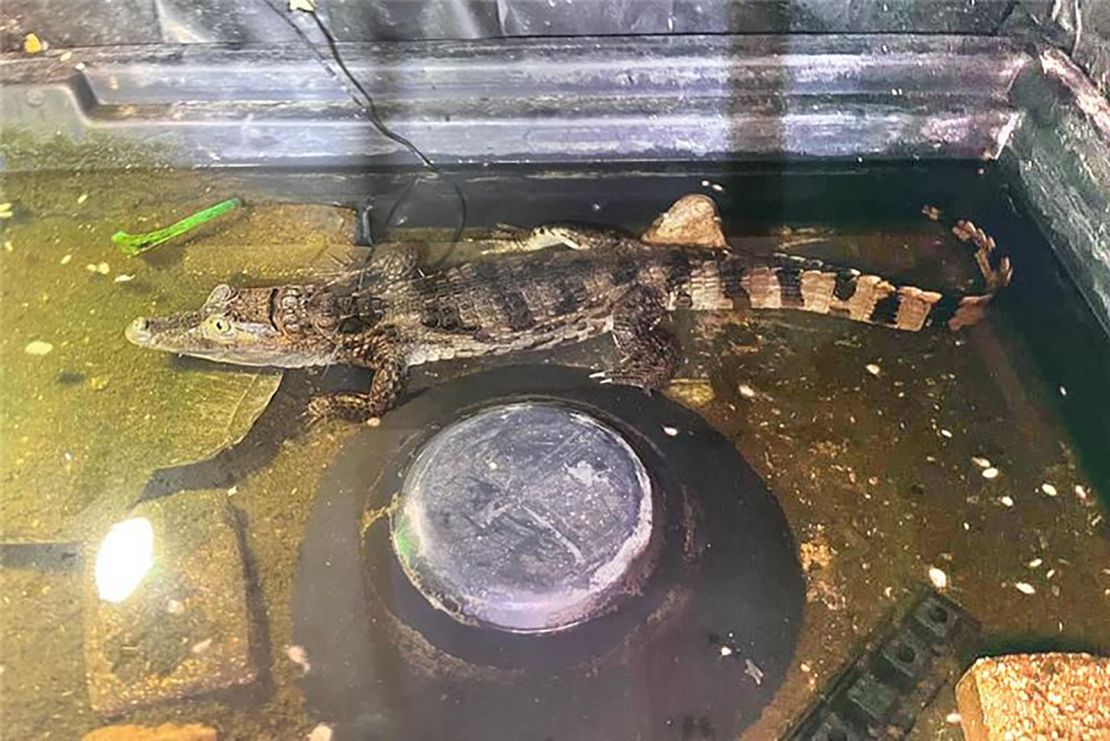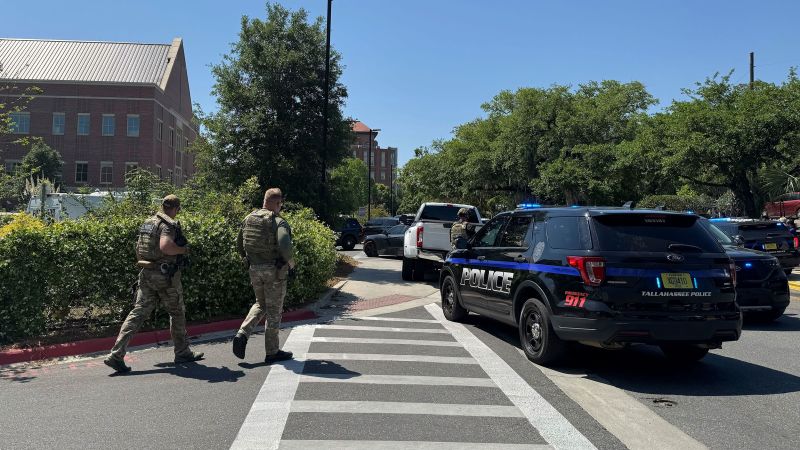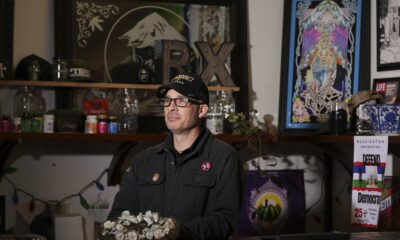CNN
—
A Florida State University student accused of killing two people and injuring six others in a shooting at the university on Thursday is the son of a local sheriff’s deputy, authorities say, and spent time training with law enforcement and serving on a sheriff’s advisory council in the years before his alleged attack.
When he was taken into custody after being shot and injured by university police, Phoenix Ikner, 20, was carrying a handgun that used to be the service weapon of sheriff’s deputy Jessica Ikner, according to officials and records.
Police have not disclosed any potential motive in the shooting. There don’t appear to be any connections between the suspect and any of the victims, Tallahassee Police Chief Lawrence Revell said Friday.
Since the shooting, Ikner’s previous classmates from his time at Tallahassee State College have said his political beliefs were extreme and they were made uncomfortable with his “concerning rhetoric” – including describing Civil Rights icon Rosa Parks as being “in the wrong,” defending the use of Nazi symbols, and disparaging pro-Palestinian and Black Lives Matter protesters. It’s not clear if politics was a factor in Thursday’s shooting.
More about his childhood and upbringing is also coming into focus. A review of court records shows Phoenix Ikner had a tumultuous childhood, with a woman — identified in the documents as his biological mother — accused of removing him from the US in violation of a custody agreement when he was 10 years old.
Sheriff Walter McNeil told reporters that the suspect was “steeped in the Leon County Sheriff’s Office family and engaged in a number of training programs that we have, so it’s not a surprise to us that he had access to weapons.”
Jessica Ikner has served at the sheriff’s department for more than 18 years, McNeil said, adding that “her service to this community has been exceptional.” She did not respond to a request for comment.
The sheriff’s office said Friday that Jessica Ikner requested and was granted personal leave and was also transferred to the property crimes unit due to the circumstances of the situation. She previously served as a school resource officer, McNeil said during a news conference Thursday.
After the shooting, police recovered an AR-15 style rifle, in addition to the .45 caliber pistol and shotgun recovered at the scene, inside the car Phoenix Ikner drove to campus, according to a law enforcement official familiar with the ongoing investigation. The car was registered to the suspected gunman’s father.
The multiple firearms indicate to investigators he may have been prepared to shoot more people had he not been confronted by law enforcement, the official added.
University police shot Phoenix Ikner on the campus Thursday after he “did not comply with commands,” Revell said, adding he did not believe Ikner fired at officers. He has “significant” but not life-threatening injuries and “will remain in the hospital for a significant amount of time” before he is taken to a detention facility, Revell said Friday.
Ikner, who invoked his right not to speak when he was taken into custody, “will face the charges up to and including first degree murder” once he is released from the hospital and taken to a detention facility, Revell said in a video message on Friday.
The suspected gunman suffered from emotional dysregulation for which he had been prescribed medication, according to the law enforcement source. Investigators were told during interviews with family members that he had stopped taking some of this prescribed medication, the source added. It’s too soon to say whether this may have played a role in Thursday’s violence but will likely be probed as investigators dig into his background.
On Instagram, an account with Ikner’s name and photo that was taken offline after he was publicly identified included a biblical quote on its profile: “You are my war club, my weapon for battle; with you I shatter nations, with you I destroy kingdoms.”
Phoenix Ikner is a registered Republican, according to Florida voter registration records. He was quoted in January in an FSU student newspaper article about anti-Trump protests in advance of the president’s inauguration.
“These people are usually pretty entertaining, usually not for good reasons,” Ikner was quoted as saying. “I think it’s a little too late, he’s (Trump) already going to be inaugurated on Jan. 20 and there’s not really much you can do unless you outright revolt, and I don’t think anyone wants that.”
Ikner is a junior political science major at Florida State, university spokesperson Stephen Stone said Friday, noting that Ikner had transferred to FSU for this spring semester from Tallahassee State College. He received an associate’s degree from Tallahassee State in December, the college’s director of communications, Amanda Clements, told CNN.
Because Ikner’s mother is a Leon County sheriff’s deputy, the sheriff’s department won’t investigate Thursday’s shooting or have anything to do with the suspect’s detention, Revell said.
‘Concerning rhetoric’ in class and student groups
Five current and former students at Tallahassee State College, where Ikner graduated from last year, told CNN that he made peers uncomfortable in class and during political discussions by expressing what they saw as extreme views.
Two brothers, Lucas and Logan Luzietti, said they took a national government class with Ikner at Tallahassee State College in the spring of 2023, where Lucas described Ikner espousing “concerning rhetoric.”
Logan recalled a conversation about gentrification where Ikner said Black people were ruining the property value of his neighborhood. Ikner also criticized Rosa Parks for refusing to give up her seat on an Alabama bus, Logan said. Ikner also claimed Joe Biden was not the legitimate president of the United States, Lucas said.
“He would joke about the deaths of minorities,” Lucas said. “He talked about how Stonewall was bad for our society,” he added, referring to a pivotal moment in the LGBTQ+ civil rights movement.
Riley Pusins, who became the president of a nonpartisan political discourse club last fall, says he remembers Ikner calling protesters in the pro-Palestinian movement and demonstrations that followed the police killing of George Floyd “dirty rats.”
Another club leader, Andrea Miranda, said Ikner’s rhetoric toward minorities made her uncomfortable, saying the way he spoke about them was “very demeaning and belittling.”
“He never really had respect for anyone in the club that didn’t share his personal political views,” Miranda added.
CNN has not independently verified claims about the suspect’s beliefs.
Reid Seybold, an FSU student, told CNN he knew Ikner from Tallahassee State College and encountered him in an extracurricular political club a few years ago. Seybold said Ikner was asked to leave the group, which discussed current events, due to behavior that unsettled others.
“He had continually made enough people uncomfortable where certain people had stopped coming. That’s kind of when we reached the breaking point with Phoenix, and we asked him to leave,” Seybold told CNN’s Omar Jimenez Thursday.
Seybold said Ikner’s comments went “beyond conservatism.”
Ikner had been taking a class at FSU on authoritarian regimes, said David Batista, an FSU senior who was enrolled in a class with Ikner and says he was on campus the day of the shooting. He said “there were no red flags.”
“He never said anything outrageous,” he said, though there was one occasion where Ikner appeared to downplay the effects of a dictatorship. “It never struck me that he was extreme as they say he is,” Batista added.
FSU President Richard McCullough told CNN Friday he was not aware of any warnings signs or potential concerns shared with the school before the shooting.
Investigators are looking at the possibility of a connection between the shooting and a protest scheduled for 2:45 p.m. by the university’s Tallahassee Students for a Democratic Society, according to the law enforcement official, but the investigation is still in its early phases. The suspect was previously critical of the student group.
Community members said they were still struggling to reconcile Phoenix Ikner’s ties to the police force with his alleged attack.
Phoenix Ikner was a member of the sheriff’s Youth Advisory Council, which is designed to “provide an open line of communication between the youth of Leon County and local law enforcement,” according to a news release from 2021. McNeil described him as a “longstanding member” of the council.
Jacob West, a member of the sheriff’s youth council, described Phoenix Ikner as “helpful and bright” and “pretty friendly and honest.”
“He wasn’t even political around us,” West said, adding that they talked about pickup trucks and video games.
To join the advisory council, students had to apply and go through a background check, so the sheriff’s office would have reviewed Ikner’s application and approved him, West said.
They then receive training on how to communicate with the public and get security clearances, West said. People on the council typically have an interest in working in law enforcement, he said. “We all had an interest in doing something good for our county.”
Kenniyah Houston, another member of the sheriff’s youth council, told CNN she was shocked to learn that the suspected shooter had served alongside her. She did not personally remember Ikner but said the advisory council was focused on making the community better and improving law enforcement, so his actions were especially shocking.
“That’s what it was all about – making better decisions,” she said. “For something like this to happen from someone in a group like that is scary … it’s devastating.”
Phoenix Ikner was born in August 2004 in Tallahassee, and was named Christian Eriksen for most of his childhood. At age 15, he changed his name to “Phoenix” because “he sees himself as a phoenix, rising from the ashes with renewed youth and life,” according to a judge’s description of his testimony.
Leon County court records – which span nearly 17 years from the time Phoenix Ikner was 2 years old until he was 19 – detail acrimonious allegations between his parents, Christopher Ikner, an American, and Anne-Mari Eriksen, a dual Norwegian American citizen.
One court filing by the biological mother characterizes the child, then 10 years old, as being “in the middle of a war.” She was prosecuted for violating a custody agreement in 2015 by taking him out of the country.
Neither of the suspect’s parents responded to requests for comment from CNN Thursday and Friday.
While the parents initially agreed to share custody in 2007, Christopher Ikner moved to modify the custody agreement when Phoenix Ikner was five, claiming that his son’s mother had left him in “deplorable” hygiene and failed to keep up with his speech therapy. Anne-Mari Eriksen denied those allegations in court documents, writing that Phoenix Ikner had been dealing with health issues.
Over the next few years, the parents traded allegations that they were harassing each other or neglecting their care of their son. The disputes came to a head in March 2015, when Eriksen took custody of the then 10-year-old during spring break.
According to allegations filed by Christopher Ikner in a later petition, Phoenix Ikner told his father he thought his biological mother was taking him to Disney World for spring break, but instead Eriksen took him to an airport and flew to Norway.
A Norwegian court ordered Phoenix Ikner to be returned to Florida in June 2015, and Christopher Ikner and his wife Jessica came to Norway to get the child. The father wrote that he was “assisted by police in Norway to find and take custody” of his son, returning to the US the following month.
Back in the US, Eriksen was charged with removing a minor from the state against a court order. She pleaded no contest to the charge, and was sentenced to 200 days in jail, followed by two years of “community control” and then two years of probation, according to court records. She was ordered to have no contact during her sentence with her son or any of his teachers, doctors or counselors, unless allowed by a court.
In February 2017, a judge granted Christopher Ikner sole parental responsibility.
During a June 2020 hearing on Phoenix Ikner’s name change, a magistrate judge in the case described him as “a mentally, emotionally, and physically mature young adult, who was very articulate, quite intelligent, very well spoken, and very polite.” The judge also said he’s an “honor roll student” who “came to the hearing dressed in his NJROTC uniform.”
His former name, the judge wrote, was “a constant reminder of the 2015 tragedy he suffered through” – an apparent reference to the Norway incident – “and of his mother who he has not seen or spoken to since 2015.” Ikner had attended counseling to “help him cope with these past events,” the judge wrote.
For the last decade, according to the records, Phoenix Ikner has been raised by his father, who is married to the Leon County sheriff’s deputy. His biological mother wrote in a 2023 court document that she had not seen her son in eight years.
But just after the shooting, the biological mother posted on Facebook complaining that her son’s dad hadn’t responded when she wrote “to ask if everything is alright with my son, who studies at FSU.”
CNN’s Taylor Romine and Blake Ellis contributed to this report.




























